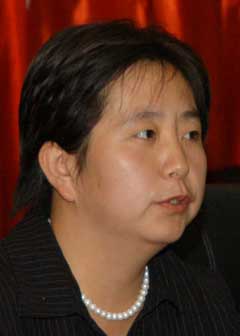Bigger role for trade unions 'to reduce strikes'
A senior trade union official blamed "inefficient" grassroots trade unions in private and overseas-funded firms for a spate of strikes over the past few months.
Guo Chen, of the All China Federation of Trade Unions (ACFTU), pledged to boost union power in these firms to address an increasing number of labor disputes involving demands for higher wages across the country.
Guo, a deputy division chief overseeing grassroots organizations with the capacity building department under the ACFTU, said helping unions boost their negotiating power was a priority.
|
|
|
Guo Chen, is a deputy division chief of the capacity building department under the ACFTU. [China Daily] |
"Helping private and overseas-funded companies nationwide to establish trade unions and boost workers' collective negotiating power over wages will be our key task," she told China Daily.
Last year, about 684,000 cases were reported to labor arbitration committees, while more than 319,000 labor dispute cases were heard by the courts, according to statistics from the ACFTU.
Disputes were almost always related to pay demands, and the number of disputes has been soaring in the first half of this year, ACFTU spokesman Li Shouzhen said.
Sometimes disputes can take a tragic turn as in the suicides over the past few months among employees of Taiwan-based Foxconn at its manufacturing compound in Shenzhen, Guangdong province, over working conditions.
A spate of strikes also hit foreign-funded companies such as Japanese carmakers Honda and Toyota over demands for higher pay.
These events "showed that their trade unions were not efficient", Guo said.
A trade union should not only serve as a bridge to mediate disputes between employees and employer, but also improve collective negotiations on wages, Guo said.
She said the democratic election of union leaders was a good way to ensure better functioning of grassroots trade unions.
"Through democratic elections, union leaders who represent the interests of employees can really stand out," she said.
Many union leaders are appointed and paid by the companies whose workers they were commissioned to protect.
For employers who are not willing to sit down and talk about wages with their workers, a properly functioning trade union should help management realize the significance of collective negotiations, Guo said.
"If the Honda auto parts plant in Foshan had negotiated with workers and reached an agreement on a wage mechanism, employees might not have resorted to strikes," Guo said.
Setting up trade unions in private and foreign companies would help workers' voices be heard by employers and also safeguard their legal rights, she added.
About 80 percent of enterprises in China are privately run or foreign owned, employing about 75 percent of the country's total urban workforce, according to the National Bureau of Statistics.
By the end of last year, 79 percent of overseas-funded companies and 78.5 percent of private companies had set up trade unions, ACFTU figures showed.
ACFTU plans to have trade unions established in 90 percent of the country's corporate units by 2012, Guo said.
The target for private and overseas-funded companies was under discussion and would be released in October, she said.
At the end of last year, the country had 1.84 million grassroots trade unions with 226 million members, according to official figures.
But Guo said some difficulties still remained in empowering trade unions in overseas-funded companies.
Some local governments had promised enterprises not to set up trade unions to attract foreign investment, Guo said.
Lack of a full understanding of Chinese trade unions would hamper the enthusiasm of foreign businesses to set up the organizations, she said.
Wal-Mart, one of the first foreign companies in China to set up trade unions, has opened more than 190 outlets in the country.
Vivian Jiang, a public relations manager with the retailer, told China Daily in a statement that the company "respects and cares about employees and maintains a good working relationship with unions".
"Trade unions are good for business. They provide a channel of communication."
 0
0 







